|
|
|
Sort Order |
|
|
|
Items / Page
|
|
|
|
|
|
|
| Srl | Item |
| 1 |
ID:
086572
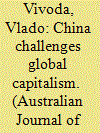

|
|
|
|
|
| Publication |
2009.
|
| Summary/Abstract |
This paper establishes a novel understanding of the nature and implications of China's rise. By borrowing Robert Gilpin's concept of sub-optimisation, it is argued that China is the most prominent player in a non-Western subgroup's suboptimisation strategy, which undermines the Western-dominated neoliberal capitalist system, or the Washington Consensus, and liberal democratic values, taken as gospel by Western economists, governments and industry for the past 30 years. While China and other non-Western states are a part of this system, a consequence of their actions within the system, and particularly in the international energy markets, is that they are increasing their relative gains at the expense of the larger group. China-led subgroup's suboptimisation strategy may result in direct competition between the predominant neoliberal Western paradigm, which is synonymous with globalisation, and which has entered into a structural crisis, and the emerging non-Western economic and political capitalist model.
|
|
|
|
|
|
|
|
|
|
|
|
|
|
|
|
| 2 |
ID:
116634
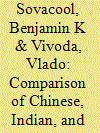

|
|
|
|
|
| Publication |
2012.
|
| Summary/Abstract |
This study explores how Asian energy security issues are perceived in China, India, and Japan. It investigates perceptions of 16 energy security challenges drawn from an extensive survey, as well as how such conceptions differ between Asian energy consumers and across these dimensions of energy security.
|
|
|
|
|
|
|
|
|
|
|
|
|
|
|
|
| 3 |
ID:
092772
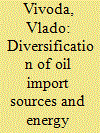

|
|
|
|
|
| Publication |
2009.
|
| Summary/Abstract |
This paper explores the relationship between the diversification of sources of imported oil and energy security of oil-importing countries. It examines the importance of diversification policy for oil importers, explains why oil importers implement oil diversification policy, and contextualizes the oil import diversification strategy in the overall energy security policy of oil importers. The paper analyzes the factors and the contexts that affect the level of importance assigned to oil import diversification policy in oil-importing countries, and the limitations that may affect the successful implication of oil import diversification policy. The examples are drawn from the world's top three oil importers, the United States, Japan, and China. The policymakers in these and other oil-importing countries place much importance on energy security. The diversification of oil import sources is used as one of the strategies to enhance energy security in oil-importing countries. This paper is important for policymakers in oil-importing countries as it provides them with a qualitative conceptual framework with which to evaluate the need to diversify their countries' sources of imported oil, and with which to identify the likely limitations to the successful implementation of oil import diversification policy.
|
|
|
|
|
|
|
|
|
|
|
|
|
|
|
|
| 4 |
ID:
098620
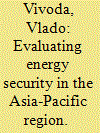

|
|
|
|
|
| Publication |
2010.
|
| Summary/Abstract |
This paper establishes an 'energy security assessment instrument' based on a new and expanded conceptualisation of energy security. The instrument is a systematic interrogative tool for evaluating energy security of individual states or regions. It consists of eleven broad energy security dimensions associated with the current global energy system. These energy security dimensions take into account numerous quantitative and qualitative attributes of each country's energy security and policy, and include both traditional energy security concerns and many new factors, such as environmental, socio-cultural and technological. Another dimension, largely absent from previous analyses, is the existence of, and the issues addressed in, energy security policy in each country. This instrument serves as an assessment system with which to evaluate energy security in the Asia-Pacific region. The existing studies on energy security in the Asia-Pacific region suffer from serious limitations. No study to date examines regional energy security policies by adopting a more comprehensive energy security definition as a starting point. Most studies also focus on a single country or issue. Even if they examine energy security in major regional economies, they lack critical comparative analysis. The instrument is valuable as it may be utilised to draw a comprehensive map of regional energy security situation, which can also include comparative analysis of energy security characteristics across the Asia-Pacific region. Ultimately, it may be utilised to set up a framework for improved regional energy cooperation with the aim of providing regional leaders with a blueprint for improving regional energy security and policy.
|
|
|
|
|
|
|
|
|
|
|
|
|
|
|
|
| 5 |
ID:
112895
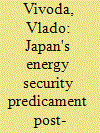

|
|
|
|
|
| Publication |
2012.
|
| Summary/Abstract |
If energy security is defined as the availability of energy at all times in various forms, in sufficient quantities and at affordable prices, without unacceptable or irreversible impact on the economy and the environment, Japan is facing an energy security predicament. For a country that was already uneasy about energy security, the March 11, 2011 earthquake and tsunami, which caused a nuclear catastrophe in TEPCO's Fukushima Daiichi nuclear power plant, turned this unease into outright anxiety. With the temporary and/or permanent closure of many nuclear reactors Japan has had to replace lost power. Tokyo has had no choice but to secure additional fossil fuels, a strategy that has negatively affected Japan's economy due to rising fuel costs. The increase in Japan's fossil fuel consumption has also caused a significant increase in greenhouse gas emissions, and affected Tokyo's commitment to Kyoto targets. This paper analyzes the consequences of the 2011 nuclear disaster for Japan's energy security. Recognizing that Japan's future energy policy choices are constrained and path dependent, the paper outlines energy policy recommendations for Japan's government.
|
|
|
|
|
|
|
|
|
|
|
|
|
|
|
|
| 6 |
ID:
166573
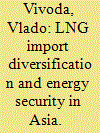

|
|
|
|
|
| Summary/Abstract |
Asia's share of global demand for natural gas has increased from 12 to 21 per cent since the turn of the century, and the overall consumption has more than doubled. At the same time, there is a widening gap between regional natural gas demand and supply, with increasing reliance on imports. In 2017, Asian importers absorbed 72 per cent of globally traded liquefied natural gas (LNG). Their LNG import dependence is forecast to grow significantly over the coming decades. This paper explores major Asian importers' approaches to LNG import diversification between 2001 and 2017 and explains why patterns of LNG imports differ across countries and over time. The focus of the paper is on five largest LNG importers in the region: China, India, Japan, South Korea and Taiwan. The paper utilises the Herfindahl-Hirschmann index (HHI) of market concentration to evaluate LNG import diversification across the five countries. The analysis contributes to a growing body of literature that evaluates various aspects of energy import diversification in the context of broader energy security strategies. Findings suggest that all countries have improved their LNG import portfolios, although there is significant temporal variation across countries. Reflecting on the relationship between energy security and growth, the paper concludes by outlining policy implications for regional energy policymakers.
|
|
|
|
|
|
|
|
|
|
|
|
|
|
|
|
| 7 |
ID:
192649


|
|
|
|
|
| Summary/Abstract |
This study examines the evolution of drone tactics employed by drug cartels in Mexico from 2017 to 2022. The research traces the increasing sophistication of drone technology, payload capacities, and adaptability of cartels in employing airborne drones in low-intensity conflicts It also highlights the increasing reliance on drones for various purposes. The analysis reveals insights into how criminal organizations adapt to the changing technological landscape, incorporating drones into their operations and creating new challenges for law enforcement. The analysis outlines strategies and identifies specialized measures to counteract this asymmetric warfare.
|
|
|
|
|
|
|
|
|
|
|
|
|
|
|
|
|
|
|
|
|